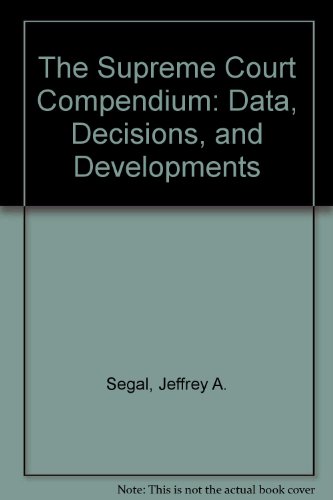The Supreme Court Compendium: Data, Decisions, and Developments - Hardcover

Information comes from a variety of sources, which are cited for each table: published reports of Court decisions, electronic information retrieval systems (LEXIS, WESTLAW, and Project Hermes), archived databases (U.S. Supreme Court Judicial Databases, National Opinion Research Center's General Social Survey), governmental reports (Statistical Abstracts, annual reports of caseloads), and assorted historical accounts and secondary sources such as the Dictionary of American Biography. Whenever possible, tables cover from February 1790 to the present.
Chapters 13 focus on the Supreme Court as an institution. Tables trace congressional legislation that affected the Court, budget appropriations, salary histories of the justices, the Court calendar, employees of the Court, landmark decisions, and chronological and topical trends. It's interesting to note that in 1900, 151 of the 197 cases heard were decided by unanimous decision; by 1952 only 17 of 104 decisions were unanimous. Chapters 46 emphasize the individual justices' characteristics, such as family backgrounds, childhood environments, education and employment histories, political and military experiences, and scholarly credentials. Also covered are circumstances surrounding retirements, resignations, and deaths; quotations from classic opinions; voting behavior; and agreement patterns. All of this information is available elsewhere, but not in concise tabular form. Patterns are easily seen in the chronologically arranged tables, such as the party switching that characterized many of the Supreme Court nominees of Andrew Jackson, Martin Van Buren, Abraham Lincoln, and Rutherford B. Hayes. The alphabetically arranged tables can be misleading; at first glance table 4-8 seems to show that all justices had prior political experience at either the state or federal level and table 4-9 that all had prior judicial experience, but neither table includes all justices.
For some, the most interesting parts of the compedium will be chapters 710. They reveal the political and social environment in which the Court operates and show some trends in its impact on our society and vice versa. Tables show congressional legislation that has been subject to litigation, constitutional amendments that have been ratified to alter Court decisions, the public's view of the Court, and the possible effect of Court rulings on public policy questions such as capital punishment, abortion, and affirmative action.
A compendium, by its nature, does not try to resolve controversial issues but presents data that allow others to draw their own conclusions. This one certainly provides food for thought, and the selected bibliography suggests further reading. It is a desirable, but optional, purchase for most libraries because all of the information can be located in other sources. But the time-saving convenience and the affordability of this volume recommend it to libraries where there is interest in the Supreme Court.
Joan Pedzich, Harris, Beach & Wilcox, Rochester, N.Y.
Copyright 1994 Reed Business Information, Inc.
"About this title" may belong to another edition of this title.
- PublisherCq Pr
- ISBN 10 0871877716
- ISBN 13 9780871877710
- BindingHardcover
- Number of pages741
- Rating
Buy New
Learn more about this copy
Shipping:
US$ 3.50
Within U.S.A.
Top Search Results from the AbeBooks Marketplace
The Supreme Court Compendium: Data, Decisions, and Developments
Book Description Hardcover. Condition: New. Seller Inventory # 24JAN2109

